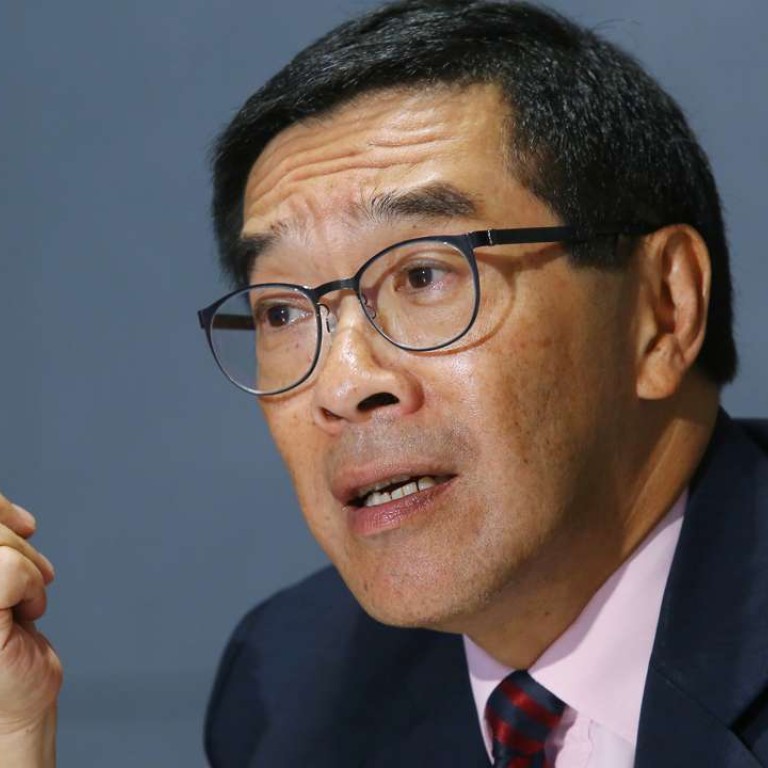
SFC wants to play bigger role in vetting new listings but won’t replace HKEX as front line regulator, says its chairman
Using football analogy, Carlson Tong says he wants to expand SFC from goalkeeper to defender and midfielder, while HKEX remains as striker
The Securities and Futures Commission has no intention of taking over the Hong Kong Exchanges and Clearing’s front-line role in regulating new listings and the recent proposals are aimed at involving the SFC in the listing process at an earlier stage, according to chairman Carlson Tong Ka-shing.
“The SFC now acts only as a goalkeeper in a soccer match. The proposed changes will allow it to play the roles of a defender and midfielder, while HKEX will remain as the striker,” Tong told the South China Morning Post.
The SFC and HKEX last month jointly launched a three-month consultation to collect the views of the market on changing the listing process.
Under the proposals, the SFC will no longer vet simple applications and will leave the job to the HKEX and market participants.
The proposals also call for the establishment of a listing regulatory committee and a listing policy committee, with equal representation from the SFC and HKEX.
The regulatory committee will handle listing applications deemed complicated by the HKEX’s listing division. The other panel will decide on policies and will meet every three months. Both committees will require a majority vote in making any decisions.
Tong said the proposals would not give more power to the SFC because under the law, the SFC was the ultimate securities regulator and had the right to veto any listing decision or policy set by the HKEX.
Neither the government nor the SFC has any intention to change the role of the HKEX as a front-line regulator
They would instead help prevent clashes between the two bodies through discussions in the two new committees, he said.
Under the current regime, the SFC does not discuss listing policies with the HKEX, which submits proposals for its approval.
Clashes broke out in August last year when the HKEX proposed a consultation to introduce a dual shareholding structure but was publicly rejected by SFC a week later.
“If the proposed listing policy committee is established, there would be a single forum for all stakeholders including the SFC, the listing committee, and for the first time, HKEX, to exchange views and decide on policy developments which may require changes to the listing rules,” Tong said. “This arrangement would enable the SFC to make its views known on important listing matters and resolve any differences at an earlier stage.”
He cited as an example the controversial listing application of mainland e-commerce giant Alibaba Group Holding in Hong Kong, which sought to allow key executives to name a majority of the board directors. The SFC could not give an opinion in the process and had to let the HKEX and the listing committee handle it.
Tong said the proposed regulatory committee would allow the SFC to discuss similar cases in future.
Alibaba owns the South China Morning Post.
Some analysts have called on the SFC to take over the front-line regulatory role of the HKEX to solve the conflicting role of the exchange as a listed company and regulator. In Britain, new listings are approved by an independent body.

He said the current proposals would not need any law change and hoped they could be implemented in the first half of next year if they won market support.
Tong said the SFC and the HKEX were also discussing how to reform the Growth Enterprise Market. There would be another consultation but the timetable has not been fixed.
“We would discuss the role of GEM as a whole, including whether we should come up with ways to attract more technology firms to list here,” he said.
The GEM, set up in 1999, was initially aimed at attracting technology firms but not many start-ups were interested. However, some consumer and retail stocks listed on the junior board.
The quality of GEM has been under the spotlight as some of companies were sold off shortly after listing to provide back-door entry for other firms, earning themselves a fee and causing fluctuations in their share prices in the process.
Tong said the HKEX had recently introduced some rules to tighten back-door listings. The GEM review would find way to define the role of the second board and improve market quality.
In response to calls for adopting a disclosure base to let companies disclose information instead of letting the regulator vet the listings, Tong disagreed with such an approach.
“Hong Kong with a high degree of direct retail participation does not have class action, so investors who suffered losses would find it difficult to seek compensation,” he said. “Therefore, it is important for the SFC and HKEX to determine whether or not a listing applicant is suitable for listing.
“Assessing suitability, which has been a gatekeeping of listing regulation for many years, will remain unchanged going forward.”

